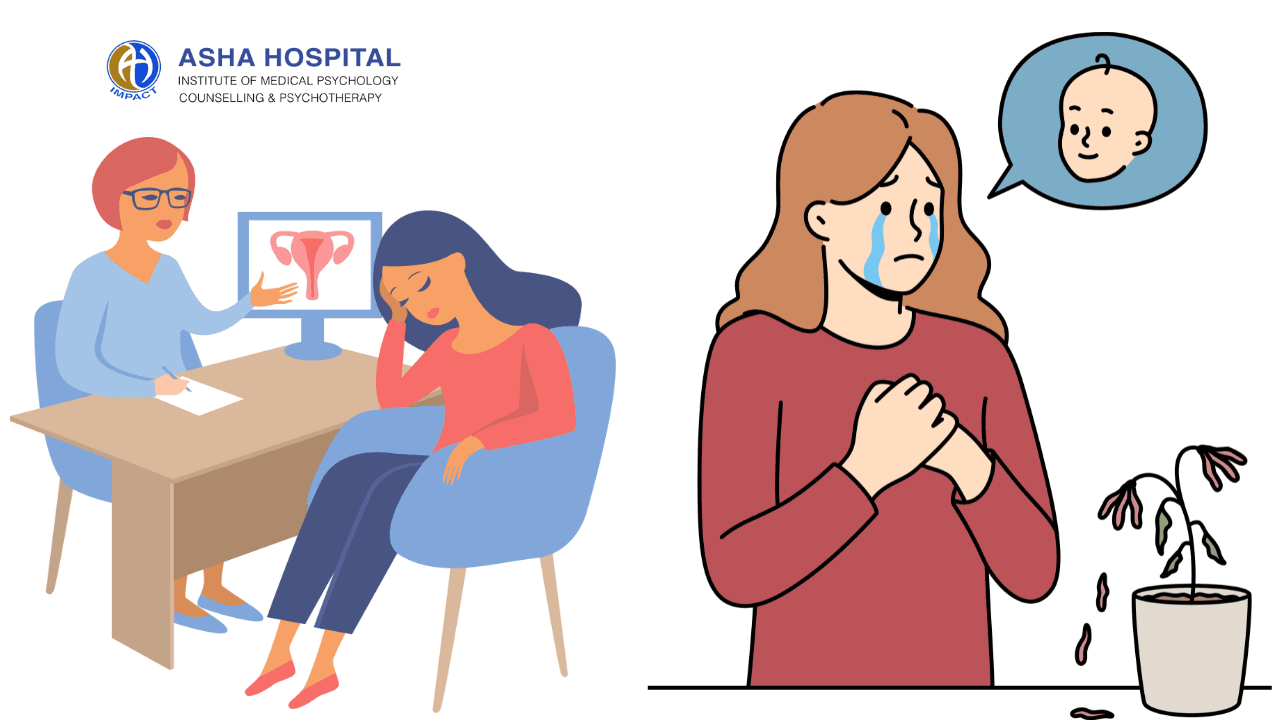Infertility is a multidimensional stressor requiring many emotional adjustments in a couple aspiring to be parents and can be threat to their personal visions. People feel pressured to have children and failing so does bring feelings of shame and guilt, more so in women. Though infertility is not a life threatening condition, psychologically distressing emotions such as shock, depression, anger and frustration, low self esteem and low self confidence are often experienced by the couple.
It can also be associated with decrease in sexual desire and satisfaction when “sex by the clock for procreation” is required. Couples battling stress from infertility often conceal their emotions as it is still considered a private subject, reduce their social interactiveness to avoid embarrassments and difficult interactions with others which pushes them to further isolation and despair
Couples suffer in silence unaware that infertility is very prevalent affecting one in 8 couples worldwide.
World Health Organisation defines infertility is the inability of a sexually active, non contracepting couple to achieve pregnancy in one year. Infertility is estimated to affect 8-12% of couples worldwide.

Infertility and psychological distress are related to each other in a complex way.
On one hand, couple with infertility is subjected to greater stress and have increased risk of developing psychological disorders compared to normal couples. On the other hand high levels of stress and psychiatric disorders and its treatments associated can cause infertility in a few couples.
Poor coping techniques, marital conflicts, self harming behavior is common cause of distress in couple undergoing infertility
Infertility induced stress is often accompanied by impulsive behaviors, issues with their anger management, feelings of hopelessness and rejection and marital conflicts, mostly attributing to negative self concept and low self esteem on couples failure to achieve their dream (to have a child of their own). Prevalence of Inter personal violence is 50% among couples reporting infertility and psychiatric morbidity is 46%, amongst them predominantly experienced are depression and anxiety. Self harm behaviors and risk of suicide is high in women suffering from fertility issues.
In the absence of medically identifiable causes of infertility…
Hormonal and structural abnormalities may not be the only etiology for infertility, emotional stress in women can cause tubal spasms, vaginismus and anovulations. Fear of pregnancy, delivery or maternity, concerns regarding changing body shape during pregnancy, fear of losing one’s life during pregnancy and childbirth, fear of failing as a mother are not uncommon in women and are potiential underlying psychological reasons of infertility amongst women.
Depressive and Anxiety disorders are common in couples undergoing infertility treatments
An higher incidence of anxiety and depressive disorders has been identified in patients with infertility in a number of studies from different societies. Prevalence of anxiety was higher in women with infertility comparable with patients diagnosed with HIV positive, cancer, heart diseases or other serious life threatening diseases. Mood disorders were reported to be 3.4 times higher and anxiety disorders to be 2.7 times higher in women with infertility compared to those who had no health issues (control group). Apart from anxiety and depressive disorders, other psychiatric comorbities such as sexual dysfunction, somatisation, dysthymia, panic disorders, eating disorders are also common in women undergoing treatments for infertility.
Depression can directly affect the fertility in women
The functions of hypothalamic-pituitary-adrenal axis (HPA), and the hypothalamic-pituitary-gonadal axis (HPG) which regulates reproductive function are disrupted in depression. Excessive levels of cortisol or catecholamines which are released in response to stress, during critical windows in the conception process can adversely impact ovulation, menstruation, implantation, and pregnancy viability.
Does treatments used to treat infertility affect psychological health?
Treatment for infertility is essential to realize the dreams of parenthood, psychological side effects due to hormonal treatments can be effectively managed.
Synthetic Oestrogen such as Clomiphene citrate which is often prescribed to improve ovulation can trigger anxiety, irritability, mood swings and sleep disturbances in some women. Letrozole, estrogen receptor blocker and Lupron which is a GnRH agonist can cause sleep disturbances, mood swings, depression and anxiety symptoms and decreased sex drive in some women.
Oral contraceptives are typically used to regulate irregular menstrual cycles. They may lead to small yet significant rise in depressive symptoms and irritability, though the risk declines with age, adolescents are at higher risk probably owing to the heightened sensitivity to hormones, especially those using progestin only pills. Vaginal and intrauterine hormonal contraceptives were also associated with an increased risk of depression though much lower levels were released from these preparations. However, the data suggests that enough hormones are released by these methods of contraception to have an impact on one’s vulnerability to depression
Women with pre existing psychiatric disorders may have an increased risk of relapse.
Treatments for infertility have been shown to be a trigger for both depression and anxiety. More so ever, women with preexisting depression and anxieties, who have been stable on medication, may relapse while on treatment for infertility. Women were found to have higher depression and anxiety scores during an embryo transfer and after failure of IVF treatments.
Effective Treatment of Depression improves Success rates on IVF and other ART’s!
Treatment of depression and anxiety is important during infertility treatment as there is evidence stating that depression may negatively affect the success rates of treatments for infertility. Stress hormones such as cortisol may affect the implantation and placental functioning. Interventions to reduce stress may improve fertility rates and early pregnancy loss.
Treatment may include psychotherapy, relaxation exercises (for milder symptoms) and as well as medications (for moderate to severe symptoms) depending on the nature of symptoms.
Cognitive behavioural therapy (CBT) helps the couple to deal with negative thoughts about self and others, emphasizing about how we feel and what we do. CBT enables them to observe their thoughts and reflect on thinking errors and thus resultant behaviours. Mindfulness based interventions also help individuals improve self compassion, coping methods. Relaxation exercises including progressive relaxation techniques, meditation, imagery have shown to reduce anxiety in women undergoing infertility treatments.
In a study that compared IVF outcomes in women who were exposed to SSRI and who were not, showed no significant differences between the groups in terms of peak estradiol levels, number of oocytes retrived and number of oocytes fertilized, percentage of 8 cell or blastocysts developed, day of transfer or initial hCG values, number of live births (Cesta CE et al., AN.Fertil Steril. 2016).
The study noted that women who are depressed and not on antidepressants had lower success rates with IVF compared to women who are depressed and are taking antidepressants. Success rates of IVF and live births did not differ much between women with depression taking antidepressants and women with no depression. No increased risk of congenital malformations or poor pregnancy outcomes were seen in women who were exposed to antidepressants during their pregnancies.
Does Psychiatric Medication Cause Infertility?
Women in reproductive age, who are on certain medications such as antipsychotics which are used to treat psychotic disorders and aggression should report menstrual irregularities and their prolactin levels must be monitored at regular intervals. Elevated prolactin levels can cause irregular menstrual cycles, anovulation by altering levels of estrogen and FSH in a dose dependent manner.
Women with hyperprolactinemia may also experience decrease in libido and galactorrhea (milk secretion from breasts). Hyperprolactinemia is a reversible cause of infertility and often adjustments in dosage and switching to safer alternatives can solve the issue.
Forty five to 60 percent of women taking Valproate, an antiepileptic and mood stabilizer used in treatment of Bipolar disorder, showed signs of PCOS, hyperandrogenism and menstrual irregularity, a particular concern being, risk of PCOS is higher when it is started earlier than 20 years of age. Discussing with your women mental health specialist or your treating psychiatrist for safer alternatives will benefit.
Why Choose Asha Women’s Mental Health Clinic for Female Infertility and Mental Health?
At Asha Women’s Mental Health Clinic, we understand that infertility affects more than just the body—it also impacts your emotions, relationships, and mental well-being. Our team in Hyderabad offers expert support to help women cope with stress, anxiety, depression, and emotional pain related to fertility struggles.
We provide personalized counseling, psychiatric care, and a safe space to talk about your feelings. Whether you’re undergoing fertility treatments or dealing with repeated disappointments, our women-focused approach ensures you receive the care and support you need.
Choose Asha for compassionate, holistic mental health care during your infertility journey.
Asha Womens Mental Health Clinic – Visit HereFAQ- Perinatal Psychiatry Female Infertility and Mental Health Care
How does infertility impact a woman’s mental health?
Infertility can lead to significant emotional distress, including feelings of grief, guilt, anxiety, and depression. The societal pressure and personal desire to conceive often intensify these emotions, potentially affecting a woman’s overall well-being.
What are common psychological challenges faced during infertility treatment?
Women undergoing infertility treatments may experience heightened stress, emotional exhaustion, and fear of treatment failure. The uncertainty and repeated cycles can contribute to mental health issues such as anxiety and depression.
Can counseling help women cope with infertility-related stress?
Yes, counseling provides a supportive environment to address the emotional challenges of infertility. Therapists can offer coping strategies, emotional support, and guidance to help women navigate the psychological aspects of infertility.
Are there specialized mental health services for women dealing with infertility?
Asha Hospital offers specialized services focusing on women’s mental health, including support for those facing infertility. These services aim to address the unique psychological needs associated with infertility and reproductive health.
How can partners support each other through infertility struggles?
Open communication, mutual support, and seeking joint counseling can strengthen relationships during infertility challenges. Understanding each other’s experiences and emotions is crucial in navigating this journey together.


